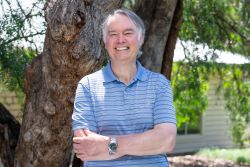The Australian Academy of Science is hosting the 2024 Haddon Forrester King Lecture at the iconic Shine Dome in Canberra. The 2024 medal recipient, Professor Stephen Cox, will give his lecture on Wednesday 21 August.
Those guests who can join us in Canberra are invited to join for the lecture, followed by refreshments. The lecture will also be livestreamed for those wishing to view from elsewhere.
Date: Wednesday 21 August 2024
Time: 5.30pm – 6.30pm for the lecture, 6.30pm – 7.30pm for refreshments
Venue: The Shine Dome and online livestream (on this page)
Active faults provide transiently permeable fluid pathways that allow the episodic escape of fluids from deep crustal reservoirs towards the Earth’s surface. In the process of migration, changes in the pressure and temperature of these fluids, as well as reactions with wall rocks, can lead to the formation of ore deposits. This process involves large fluxes of highly pressurised fluids through intrinsically low permeability host rocks.
Deep fluid injection experiments, along with natural, fluid-driven earthquake swarms, demonstrate that injection of highly pressurised fluids into low permeability rock produces distinctive, migratory earthquake swarms that involve thousands of small earthquakes. This contrasts with more typical crustal seismicity in which tectonic loading drives mainshock-aftershock sequences. These swarms are providing new insights about the extreme dynamics of ore formation in active fault zones.
This work has implications, not only for mineral exploration, but also for development of geothermal energy resources, potential pitfalls associated with deep sequestration strategies, and for our understanding of seismic hazards and the escape of volatiles, such as CO2, from the Earth’s interior.

Stephen Cox is an Emeritus Professor in the Research School of Earth Sciences at the Australian National University. His research interests are primarily in the coupling between deformation processes and fluid flow at depth in the Earth’s crust, with applications to ore genesis and earthquake mechanics. His research is pursued via field-based studies, microstructural, microchemical and stable isotope analyses, high-pressure/high-temperature rock deformation experiments and numerical modelling. His current research focusses on analysis of fluid-driven earthquake swarms and applications of that work to understanding formation of fault-related gold deposits.
Stephen holds a BSc (Hons) from the University of Tasmania and a PhD from Monash University. Over several decades he has provided structural geology training to the minerals industry. In 2007 he was the Society of Economic Geologists Distinguished Lecturer, and in 2010 was awarded the Hobbs Medal by the Geological Society of Australia.
Professor Cox's award video outlines his work further.
The Haddon Forrester King Medal and Lecture, sponsored by Rio Tinto, is one of the Australian Academy of Science’s prestigious career awards for life-long achievement and outstanding contribution to science.
The award is made in honour of the contributions of the late Haddon Forrester King whose work applied the geological and related sciences to the search for mineral deposits in Australia and elsewhere. Haddon King joined Zinc Corporation as its Chief Geologist in 1946, became Director of Exploration for the merged Conzinc Rio Tinto of Australia (CRA) in 1962 and continued in this capacity until his retirement in 1970. He was a consultant at CRA until 1986.
The award is made to a scientist, resident in Australia or overseas, and normally awarded once every two years. It recognises original and sustained contributions to Earth and related sciences of particular relevance to the discovery, evaluation and exploitation of mineral deposits, including the hydrocarbons.
events@science.org.au
events@science.org.au
© 2025 Australian Academy of Science